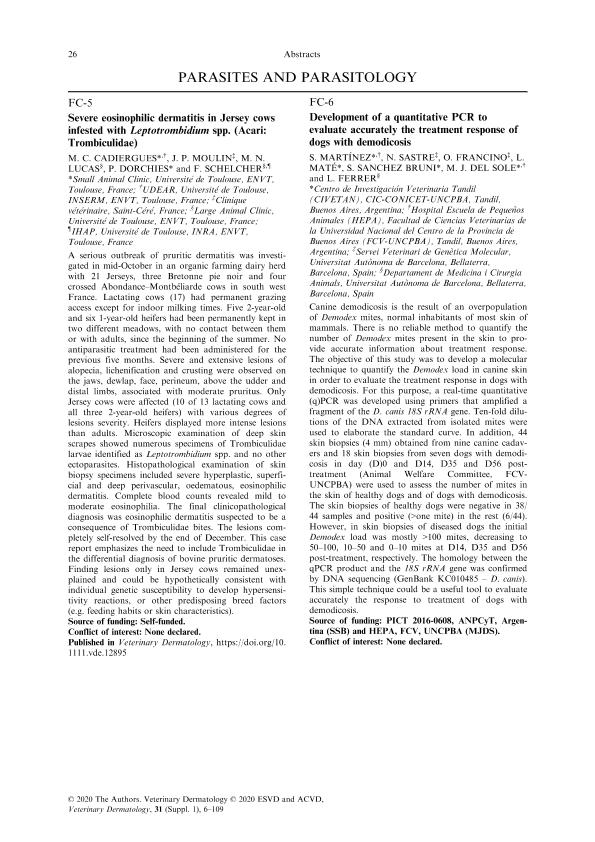Evento
Development of a qPCR to evaluate accurately the treatment response of dogs with demodicosis
Martínez, Sofía ; Sastre, Natalia; Francino, Olga; Maté, María Laura
; Sastre, Natalia; Francino, Olga; Maté, María Laura ; Sanchez Bruni, Sergio Fabian
; Sanchez Bruni, Sergio Fabian ; del Sole, Maria Jose
; del Sole, Maria Jose ; Ferrer, Lluis
; Ferrer, Lluis
 ; Sastre, Natalia; Francino, Olga; Maté, María Laura
; Sastre, Natalia; Francino, Olga; Maté, María Laura ; Sanchez Bruni, Sergio Fabian
; Sanchez Bruni, Sergio Fabian ; del Sole, Maria Jose
; del Sole, Maria Jose ; Ferrer, Lluis
; Ferrer, Lluis
Tipo del evento:
Congreso
Nombre del evento:
9th World Congress Of Veterinary Dermatology
Fecha del evento:
10/2020
Institución Organizadora:
World Association of Veterinary Dermatology;
Título de la revista:
Veterinary Dermatology
Editorial:
Wiley Blackwell Publishing, Inc
e-ISSN:
1365-3164
Idioma:
Inglés
Clasificación temática:
Resumen
Canine demodicosis is the result of an overpopulation of Demodex mites, normal inhabitants of most skin of mammals. There is no reliable method to quantify the number of Demodex mites present in the skin to provide accurate information about treatment response. The objective of this study was to develop a molecular technique to quantify the Demodex load in canine skin in order to evaluate the conventional treatment response in dogs with demodicosis. For this purpose, a real time qPCR was developed using primers that amplified a fragment of the Demodex canis 18S rRNA gene. Ten-fold dilutions of the DNA extracted from isolated mites were used to elaborate the standard curve. In addition, 44 skin biopsies (4 mm) obtained from nine canine cadavers and 18 skin biopsies from seven dogs with demodicosis in days zero and 14, 35 and 56 post-treatment (Animal Welfare Committee, FCV-UNCPBA) were used to assess the number of mites in the skin of healthy dogs and of dogs with demodicosis. The skin biopsies of healthy dogs were negative in 38 samples, being positive (>one mite) the remaining samples (six). However, in skin biopsies of diseased dogs the initial Demodex load was mostly >100 mites, decreasing to 50-100, 10-50 and 0-10 mites at 14, 35 and 56 days post-treatment, respectively. The homology between the qPCR product and the 18S rRNA gene was confirmed by DNA sequencing (GenBank KC010485 - Demodex canis). This simple technique could be a useful tool to evaluate accurately the response to treatment of dogs with demodicosis.
Palabras clave:
DEMODICOSIS
,
Q-PCR
,
MAMMALS
,
IVERMECTIN
Archivos asociados
Licencia
Identificadores
Colecciones
Eventos(CIVETAN)
Eventos de CENTRO DE INVESTIGACION VETERINARIA DE TANDIL
Eventos de CENTRO DE INVESTIGACION VETERINARIA DE TANDIL
Citación
Development of a qPCR to evaluate accurately the treatment response of dogs with demodicosis; 9th World Congress Of Veterinary Dermatology; Australia; 2020; 26-26
Compartir
Altmétricas



